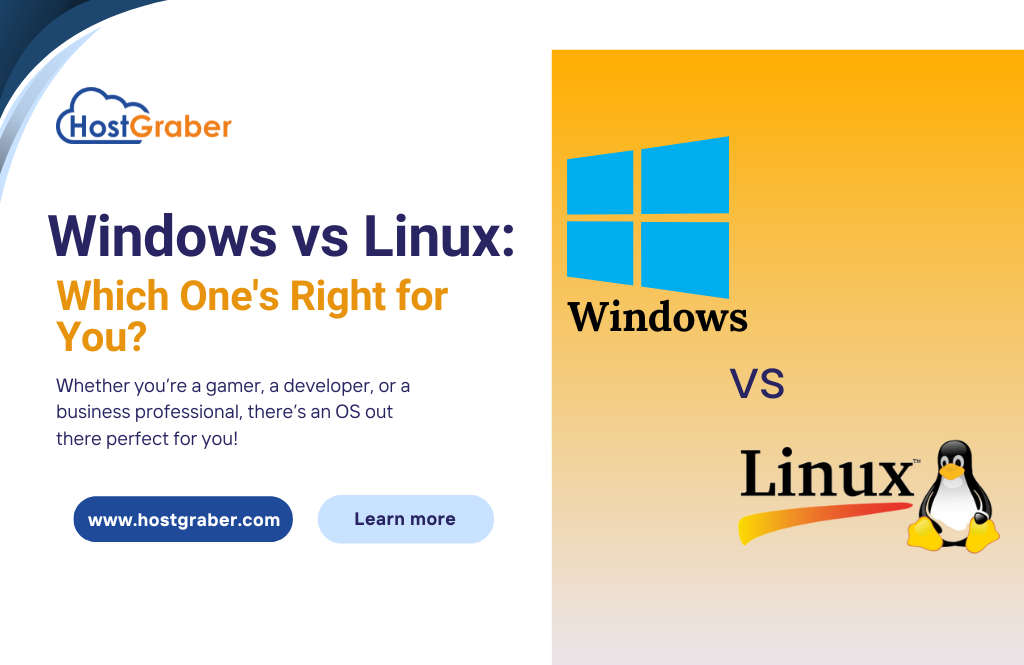When it comes to choosing an operating system (OS) for your computer or server, the debate often boils down to two major players: Windows vs Linux. Both have carved out significant spaces in the world of technology, catering to different needs and preferences. But how do you decide which one is right for you? In this article, we’ll break down the key differences, pros, and cons of Windows and Linux to help you make an informed decision.
What Are Windows and Linux?
Windows is a commercial operating system developed by Microsoft. It’s known for its user-friendly interface and widespread use in personal computers, business environments, and educational institutions. The most common versions include Windows 10 and Windows 11.
Linux, on the other hand, is an open-source operating system. Unlike Windows, it’s not owned by any single company. Instead, it’s developed collaboratively by developers worldwide. There are many distributions (or “distros”) of Linux, such as Ubuntu, Fedora, and Debian, each with its own features and interface.
Key Differences Between Windows vs Linux:
1. User-Friendliness
Windows:
- Ease of Use: Windows is known for its intuitive, user-friendly interface. It’s designed for the average user, with a familiar layout and easy navigation.
- Software Compatibility: Most commercial software, especially productivity tools and games, are built for Windows, making it a plug-and-play solution for many.
- Learning Curve: Minimal. Even beginners can get started with Windows without much hassle.
Linux:
- Ease of Use: Linux has made significant strides in user-friendliness with distributions like Ubuntu and Mint, but it still requires a steeper learning curve compared to Windows.
- Software Compatibility: Linux supports open-source software, but proprietary software (like Adobe Suite or Microsoft Office) may require workarounds or alternatives.
- Learning Curve: Higher. Linux is ideal for tech-savvy users or those willing to learn command-line operations.
If you’re looking for simplicity and ease of use, Windows is the winner. However, if you’re willing to invest time in learning, Linux offers powerful customization options.
2. Customization and Flexibility
Windows:
- Customization: Limited. Windows allows some customization (themes, wallpapers, etc.), but it’s restrictive compared to Linux.
- Flexibility: Designed for general-purpose use, Windows isn’t as flexible for specialized tasks or development environments.
Linux:
- Customization: Endless. Linux is open-source, meaning you can modify everything from the kernel to the desktop environment.
- Flexibility: Perfect for developers and tech enthusiasts. You can utilize Linux to meet specific needs, whether it’s for programming, or server management.
If customization and flexibility are your priorities, Linux is the clear choice.
3. Software and Application Support
Windows:
Supports a vast range of software applications, especially popular ones like Microsoft Office, Adobe Photoshop, and games. Hosting providers like HostGraber and GoDaddy offer Windows hosting plans suitable for applications.
Linux:
While many open-source alternatives exist (like LibreOffice and GIMP), not all Windows software runs natively on Linux. However, tools like Wine or virtual machines can bridge the gap. Preferred for web development due to its compatibility with PHP, MySQL, and Apache. HostGraber, Bluehost and A2 Hosting are known for their performance-driven Linux hosting solutions.
If you rely on popular commercial software (e.g., Microsoft Office, Adobe Suite, or gaming), Windows is the better choice. However, if you’re open to open-source alternatives, Linux can still meet most needs.
4. Security
Windows:
- Vulnerabilities: As the most widely used OS, Windows is a prime target for malware and cyberattacks.
- Security Features: Windows Defender and regular updates help mitigate risks, but users often need additional antivirus software.
- User Permissions: By default, Windows users have administrative privileges, which can lead to accidental system changes or security breaches.
Linux:
- Vulnerabilities: Linux is less targeted by malware due to its smaller user base and robust architecture.
- Security Features: Linux has built-in security features like SELinux and AppArmor, and its open-source nature allows for quick vulnerability patches.
- User Permissions: Linux operates on a strict permission model, reducing the risk of unauthorized changes.
HostGraber prioritize enhanced security features in their Linux and windows hosting plans.
Linux is more secure out of the box, making it ideal for security-conscious users.
5. Cost
Windows:
- Licensing Fees: Windows is a proprietary OS, meaning you need to purchase a license. This can be expensive, especially for multiple machines.
- Software Costs: Many Windows applications are paid, adding to the overall cost.
Linux:
- Licensing Fees: Linux is free and open-source. You can download and use it without any cost.
- Software Costs: Most Linux software is also free, making it a budget-friendly option.
If cost is a concern, Linux is the more economical choice.
6. Performance
Windows:
- Resource Usage: Windows tends to be resource-heavy, especially with background processes and updates.
- Speed: While modern Windows versions are optimized, they may still lag on older hardware.
Linux:
- Resource Usage: Linux is lightweight and efficient, making it ideal for older hardware or systems with limited resources.
- Speed: Linux distributions are known for their speed and performance, especially for development and server tasks.
For performance and efficiency, Linux takes the lead.
7. Use Cases
Windows:
- Best For: Casual users, gamers, businesses relying on Microsoft Office, and those who prefer a hassle-free experience.
- Industries: Finance, healthcare, and education (due to software compatibility).
Linux:
- Best For: Developers, sysadmins, cybersecurity professionals, and tech enthusiasts.
- Industries: IT, cloud computing, and web hosting (due to its stability and flexibility).
If you’re a casual user, gamer, or business professional relying on mainstream software, Windows is the way to go. However, if you’re a developer, or tech enthusiast working in IT, cloud computing, or web hosting, Linux is the superior choice for its stability, flexibility, and customization.
8. Support and Community
Windows:
- Professional Support: Microsoft offers dedicated professional support for Windows users, including troubleshooting, updates, and enterprise-level assistance.
- Documentation: Extensive official documentation, tutorials, and forums are available, making it easy to find solutions to common issues.
- Community: While Windows has a large user base, the community is less developer-focused compared to Linux.
Linux:
Community Support: Linux boasts a massive, active, and passionate open-source community. Forums like Stack Overflow, Reddit, and distribution-specific communities (e.g., Ubuntu Forums) are incredibly helpful.
Enterprise Support: For businesses, companies like Red Hat and Canonical offer paid support, ensuring reliability for critical systems.
Documentation: Linux has extensive documentation, but it often assumes a certain level of technical expertise.
If you prefer professional, official support and a more structured help system, Windows is the better choice.
If you value community-driven support and don’t mind digging into forums or documentation, Linux is ideal. For enterprises, Linux’s paid support options make it a strong contender.
Which OS should you choose?
- Home Users (General Use): If you primarily use your computer for browsing the web, watching videos, writing documents, and playing casual games, Windows is likely the easier and more convenient option. Its wide software compatibility and user-friendly interface make it a good all-rounder.
- Gamers: While Linux gaming has made significant strides with tools like Steam Proton, Windows still reigns supreme in the gaming world. Most games are developed with Windows in mind, and driver support is generally better.
- Web Developers: Both Windows and Linux can be used for web development. However, Linux is often preferred for its command-line interface and its similarity to server environments. Many developers find it easier to deploy and manage web applications on Linux servers.
- System Administrators: Linux is the king of the server room. Its stability, security, and command-line interface make it ideal for managing servers, networks, and databases.
- Data Scientists and Programmers: Linux is a popular choice among data scientists and programmers due to its flexibility, command-line tools, and support for various programming languages and development tools.
- Content Creators (Video Editing, Graphic Design): Both Windows and Linux can be used for content creation. Windows is often preferred due to its wider software compatibility with industry-standard tools like Adobe Creative Suite. However, Linux is gaining ground with powerful open-source alternatives like Blender and GIMP.
- Beginners: Windows is generally recommended for beginners due to its ease of use and readily available support. However, if you’re willing to learn and embrace a bit of a challenge, exploring Linux can be a rewarding experience.
Making the Switch:
If you’re currently using Windows and considering a switch to Linux, don’t worry. You can try out Linux without completely replacing your Windows installation. You can use a “live CD” or a virtual machine to experience Linux before making the full switch. There are also many user-friendly Linux distributions, like Ubuntu, that are designed to be easy to install and use.
Conclusion:
There’s no single “best” operating system. The right choice depends entirely on your needs, technical skills, and preferences. Windows is the familiar and convenient option for general users, gamers, and some content creators. Linux is the powerful and customizable choice for developers, system administrators, and those seeking greater control and flexibility. Ultimately, the best way to decide is to try both and see which one feels like the right fit for you.


